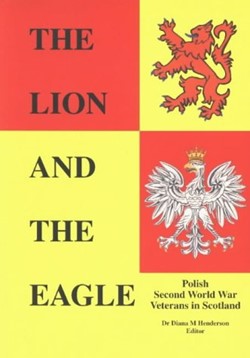Polish 2nd World War Veterans in Scotland

The Lion and the Eagle - Polish Second World War Veterans in Scotland
Diana M Henderson (Editor)
2001
ISBN 095350364X
Dunfermline, Scotland: Cualann Press
98 Books about Poland | Polish War Graves in Britain
In 1939 Poland was attacked by both Nazi Germany and the Soviet Union. Members of the Polish armed forces who managed to escape capture headed for France. When in the summer of 1940 France fell the Poles headed for Great Britain. On arrival in Britain they were sent north to Scotland. There they were reformed into the 1st Polish Corps and given the task of defending the east coast of Scotland against the threat of invasion by German forces.
In Poland the Soviet Union occupied the eastern half of the country. Stalin, the Soviet leader, deported 1.7 million Poles to slave labour camps in Siberia and Kazakhstan. In June 1941 the attack by Nazi Germany on the Soviet Union led to Stalin granting Polish prisoners an "amnesty". A Polish army was formed in the Soviet Union under the command of General Wladyslaw Anders. In 1942 Stalin allowed the evacuation of this army and the soldiers families to Persia. The Poles went on to fight major battles against the Germans in Italy under British command. At the end of the war with Poland under Soviet occupation there was no free country to return to. Many of them came to Britain and by 1946 there was around 250,000 Poles in the country.
Polish Reminiscences
The Lion and the Eagle is a book which contains the reminiscences of Polish veterans who remained in Scotland after the war.
Captain Tadeusz Apfel-Czaszka (1st Polish Armoured Division) recalls being in France at the time of the French surrender.
We were told that arrangements would be made to hand us over to the Germans as prisoners of war. We were not prepared for this to be done…we set out on a boat for Bordeaux in France…the boat was captured by the British and we were sent to Southampton…we were then sent North by train into Scotland…I went to Tentsmuir [Fife]…our job was to guard against the expected German invasion which we firmly believed would come. (pp. 20-21)
Zbigniew Budzynski (5th Polish Infantry Division) remembers being taken prisoner by the Red Army after the Soviet Union invaded Poland. He was taken by train to Murmansk and from there by boat on the White Sea to a labour camp at a place in Siberia called Ponoy. In August 1941 the Soviets set him free and he made his way south to join the Polish Army.
Eventually we arrived at Tatiszezewo near Saratov on the Volga where there was a Polish recruiting camp with tables where we queued up and signed on with the 5th Infantry division...We were given wonderful British uniforms...In February and March 1942, we heard that the Polish Army was being evacuated and in February the first lot of men left Russia and went to the Middle East…We were put on a train that went to the eastern shores of the Caspian Sea to Krosnowodsk...We sailed for Iran...So, I had spent Christmas 1939 in Lithuania, 1940 in the USSR, 1941 with the Polish Army in the USSR, 1942 in Iraq and in 1943 we went to the Lebanon. (pp. 33-34)
Lech S Muszynski describes how his father had fought for Polish independence.
My father, Stanislaw Mucha-Muszynski, joined the Polish legion…led by Josef Pilsudski, in 1914. He took part in most of the battles…For his distinguished service, he and many others, were given land in the Eastern part of Poland. They were called The Military Settlers. (p.89)
In 1939 Lech's father made his way to Hungary and then to Britain. Lech, his mother and his sister, remained in Poland. In February 1940 the Soviet Secret Police (NKVD) banged on the door of their house at 3am in the morning. They were loaded onto a train of cattle trucks and deported to the Soviet Union. They were taken to a labour camp in the Archangel Region of Northern Siberia. They remained there for about 18 months.
On 12th August 1941, we were free. The Polish Army was being formed in the Southern Soviet Republic, and that was where we decided to go...On 11th November 1941, approximately 750 people set out on an epic journey south, during which there was a lot of suffering due to starvation, diseases...At last, on Christmas Day 1941, we arrived in Buchara...420 had survived. (pp. 91-95)
Book Chapters
The book is in two parts.
Part I
- Captain Tadeusz Apfel-Czaszka (1st Polish Armoured Division)
- Zbigniew Budzynski (5th Polish Infantry Division)
- Dr Kazimierz Piotr Durkacz (Graduate of the Polish School of Medicine at the University of Edinburgh)
- Lieutenant Wieslaw Szczygiel (Lt. Col George Harvey) Polish Parachute Brigade
- Mrs Elizabeth Kendzia (Ambulance driver with the Fife Voluntary Aid detachment of the Red Cross)
- Stefan Kwiatkowski (1st Lieutenant Polish Army)
- Lieutenant Colonel J J Korabiowski (4th Polish Infantry Division)
- Squadron Leader Leslaw Miedzybrodzki AFC RAF
- Lech S Muszynski (Aged eleven at the time of the outbreak of the Second World War)
- Michael Zawada (Polish Navy)
Part II (Early Writings)
- Memoirs: September 1939 - May 1948 Wieslaw Szczygiel (Lt. Col George Harvey)
- Separated by the River Rhine Translation of an article by Wieslaw Szczygiel published in Polska Walczaca (Fighting Poland) 29th September 1945
- The Bay of Biscay Squadron Leader Leslaw Miedzybrodzki AFC RAF